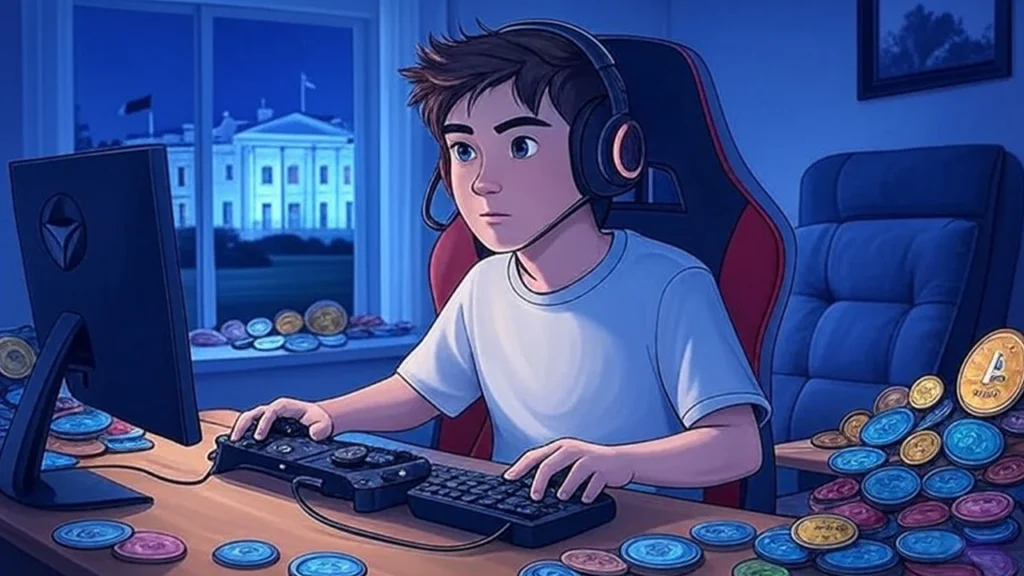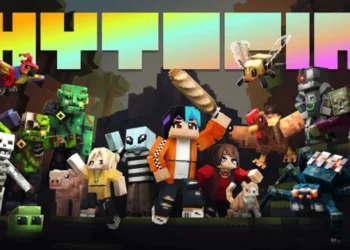Quick Take
- Roblox CEO David Baszucki says AI will create “games no one’s ever thought of.”
- Baszucki was an early investor in Sky Mavis, tying him to Web3 gaming history.
- Clearer U.S. regulation could accelerate adoption across gaming.
Roblox CEO and cofounder David Baszucki has never been shy about making big bets on the future of interactive entertainment. On Fortune’s Leadership Next podcast this week, he described AI as “human acceleration technology,” capable of creating games that are hard to even imagine today.
“It’s like comparing the horse and carriage to a modern car,” Baszucki said. “We’re still in the horse-and-carriage stage of gaming. Ten or twenty years from now, AI will superpower entirely new experiences.”
Baszucki spoke about Roblox as not just a gaming company, but a community and wellness platform — an ecosystem where millions of users create, share, and increasingly monetize their own experiences. With 85–90 million daily users and titles like Dress to Impress or NFL Universe reaching millions on their own, Roblox is already a hub for new forms of social and interactive entertainment.
But his comments also intersect with another fast-moving trend: Web3.
A Web3 Connection
Jeffrey “Jihoz” Zirlin, cofounder of Sky Mavis, noted this week that Baszucki was an early investor in the studio and familiar with Axie Infinity’s “breeding” mechanics before the game became a $40 billion fully diluted phenomenon at its peak. That connection underscores how leaders in traditional gaming and the metaverse space have long had one eye on blockchain-based models.
Web3 gaming has often been seen as experimental or niche, but that perception is changing fast. Immutable, the Ethereum scaling platform, recently expanded its Immutable Play service into the broader $300B Web2 market, signing Ubisoft as its first major partner. At the same time, entertainment IP is entering the blockchain arena, with Netflix’s Black Mirror preparing to launch its $MIRROR token on Base this month. The token ties AI-driven reputation scoring to governance and access, echoing themes from the series itself.
AI and Ownership
Baszucki’s optimism about AI dovetails with Web3’s promise of digital ownership. Roblox is already experimenting with AI-generated content, including tools that can create 3D assets or clothing from simple text descriptions. Baszucki emphasized that AI should accelerate, not replace, creators: “Behind the scenes it’s still user-generated, but it’s AI-accelerated,” he explained.
For Web3 developers, the parallels are clear. Immutable cofounder Robbie Ferguson has argued that blockchain can transform the $150B digital goods market by turning in-game items into assets with real liquidity. Both AI and Web3 offer pathways to lower barriers for creators, expand monetization, and make digital economies more efficient.
Timing and Regulation
Timing may be the critical piece. Jihoz suggested that gaming “always performs best late cycle,” pointing back to the last bull run when Axie soared, Meta rebranded from Facebook, and Roblox went public. With U.S. regulators now moving toward clearer rules on digital assets, including recognition that many tokens are not securities, the stage may be set for traditional companies to take blockchain more seriously.

Baszucki stopped short of mentioning Web3 on the podcast, but his framing of Roblox as a platform for communication, creation, and commerce echoes the same themes blockchain builders have emphasized for years. If AI becomes the creative engine, Web3 could provide the rails for true ownership and portability across ecosystems.
Convergence Ahead
The overlap is becoming harder to ignore: Roblox accelerating AI tools, Immutable onboarding Web2 studios, Sky Mavis pushing toward a full Axie MMO, and Black Mirror literally tokenizing its fanbase. These may not be coordinated moves, but they point in the same direction, toward a gaming future where AI, blockchain, and user-generated economies converge.
Baszucki may see Roblox primarily as a wellness-focused ecosystem powered by AI, but his ties to Web3 remind the industry that the next chapter of gaming may not be about choosing between technologies, but combining them.







